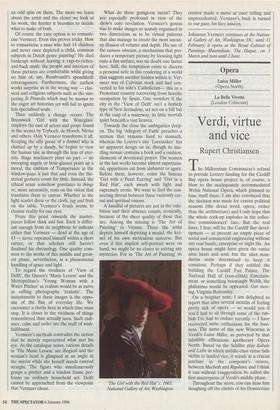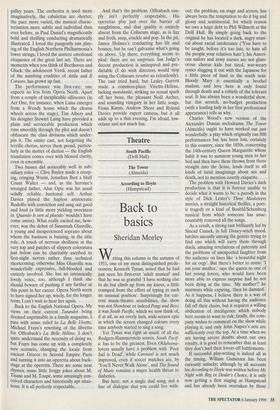Opera
Luisa Miller (Opera North) La Belle Vivette (London Coliseum)
Verdi, virtue and vice
Rupert Christiansen
The Millennium Commission's refusal to provide Lottery funding for the Cardiff Bay opera house project is, of course, a blow to the inadequately accommodated Welsh National Opera, which planned to base itself there. I am also convinced that the decision was made for craven political reasons (the dread word, opera, rather than the architecture) and I only hope that the whole cock-up explodes in the collec- tive commissioners' face. But the real loser, I fear, will be the Cardiff Bay devel- opment — at present an empty piece of social and commercial engineering without any real bustle, enterprise or night life. An opera house might have given the entire area heart and soul, but the idiot man- darins seem determined to keep it comatose. Perhaps if they retitled the building the Cardiff Fun Palace, The National Hall of (non-elitist) Entertain- ment, or something boomingly Welsh, the philistines would be appeased. Get mov- ing, Virginia Bottomley.
On a brighter note, I am delighted to report that after several months of feeling pretty sick of opera — so would you if you'd had to sit through some of the rub- bish I've had to endure recently — I have recovered some enthusiasm for the busi- ness. The name of this new Wincarnis is Verdi's Luisa Miller, as purveyed by that infallibly efficacious apothecary Opera North. Based on the Schiller play Kabale und Liebe in which middle-class virtue falls victim to landed vice, it stands at a crucial juncture in the composer's oeuvre, between Macbeth and Rigoletto, and I think it can without exaggeration be called the first masterpiece of Verdi's middle phase.
Throughout the score, you can hear him sloughing off the clichés of his Donizettian galley years. The orchestra is used more imaginatively, the cabalettas are shorter, the pace more varied, the musical charac- terisation more subtle and individual than ever before, as Paul Daniel's magnificently bold and thrilling conducting dramatically illustrated. I loved the pungently raw play- ing of the English Northern Philharmonia's lower strings, I loved the austere emotional eloquence of the great last act. There are moments when you think of Beethoven and Gluck: the adolescent Verdi, recent father of the numbing crudities of Attila and 11 Corsaro, has grown up fast.
The performance was first-rate: one expects no less from Opera North. Apart from a couple of inexplicable sillinesses (in Act One, for instance, when Luisa emerges from a Wendy house which the chorus wheels across the stage), Tim Albery and his designer Stewart Laing have provided a plain and serviceable production which runs smoothly through the plot and doesn't obfuscate the class divisions which under- pin it. The entire cast, not forgetting the terrific chorus, serves them proud, particu- larly in the matter of diction — the English translation comes over with blessed clarity, even in ensemble.
Two basses did noticeably well in sub- sidiary roles — Clive Bayley made a creep- ing, cringing Wurm, Jonathan Best a bluff Count Walter — and, as the heroine's wronged father, Alan Opie was his usual solidly reliable baritonal self. Arthur Davies played the hapless aristocratic Rodolfo with conviction and sang out good and loud (a little more yielding sweetness in Vuando le sere al placido' wouldn't have come amiss). What really excited me, how- ever, was the debut of Susannah Glanville, a young and inexperienced soprano about whom the business is buzzing, in the title role. A touch of nervous shrillness at the very top and patches of slippery coloratura just below can be charitably ascribed to first-night nerves rather than technical shortcoming; otherwise Miss Glanville was wonderfully expressive, full-blooded and entirely involved. She has an intrinsically lovely voice, too, although I think she should beware of pushing it any further at this point in her career. Opera North seem to have signed her up, wisely, for the longer term; I can't wait to hear her again.
Back to the English National Opera. My views on their current Turandot being deemed unprintable in a family magazine, I pass with some relief to La Belle Vivette, Michael Frayn's rewriting of the libretto for Offenbach's La Belle Helene. I don't quite understand the necessity of doing so, but Frayn has come up with a completely new scenario, changing the locale from ancient Greece to Second Empire Paris and turning it into an operetta about back- stage at the operetta. There are some neat rhymes, some little froggy jokes about M. Tisane and M. Toni* some amusingly con- ceived characters and historically apt situa- tions. It is all perfectly respectable. And that's the problem. Offenbach sim- ply isn't perfectly respectable. His operettas play just over the barrier of naughtiness, and that quality is entirely absent from the Coliseum stage, as is fizz and froth, snap, crackle and pop. In the pit, James Holmes's conducting has lilt and bounce, but he can't galvanise what's going on above. Up there, everything seems to plod: there are no surprises. Ian Judge's decent production is uninspired and pre- dictable (I do wish directors would stop using the Coliseum revolve so relentlessly). The cast tried hard, but Lesley Garrett made a common-place Vivette-Helene, lacking mondanite, striking no sexual spark off her beau, the pleasant Neill Archer, and sounding vinegary in her little songs. Fiona Kirrun, Andrew Shore and Ryland Davies provide expert cameos, but it all adds up to a thin evening, I'm afraid, low- octane and not much fun.



















































 Previous page
Previous page